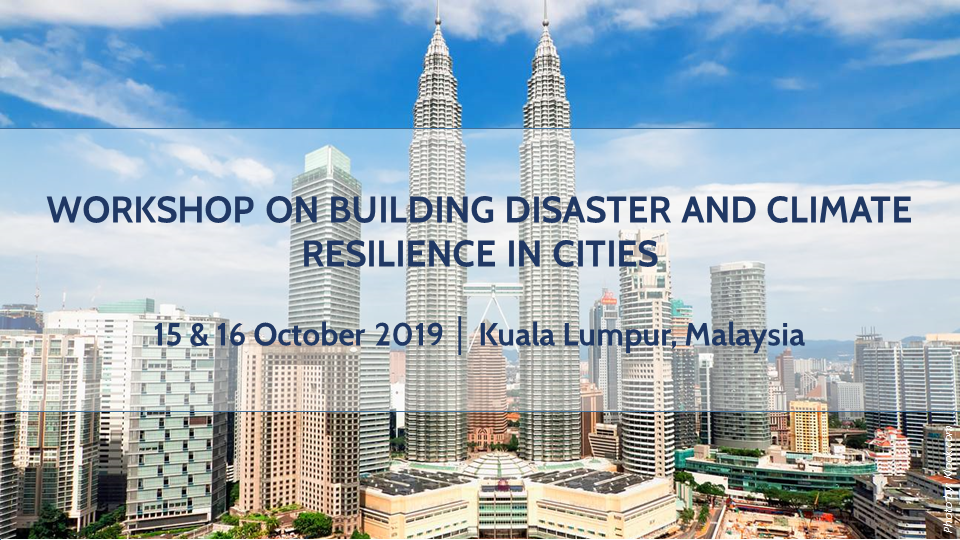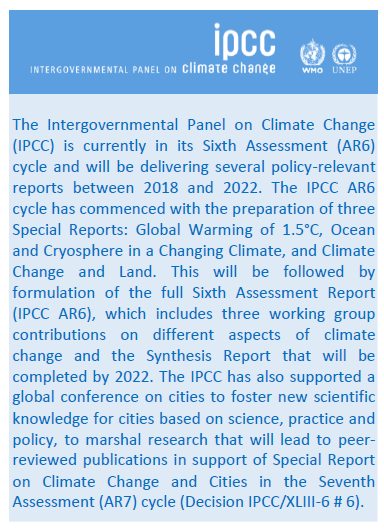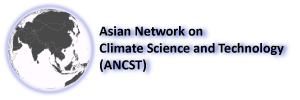

INTRODUCTION
The Asian Network on Climate Science and Technology (ANCST), coordinated by Universiti Kebangsaan Malaysia’s Southeast Asia Disaster Prevention Research Initiative (SEADPRI-UKM), in conjunction with the Asia-Pacific Network for Global Change Research (APN), International Science Council Regional Office for Asia and the Pacific (ISC-ROAP) and other partners are collaborating with the IPCC to enhance support for the AR6 cycle in the region. A Workshop on the Status of Climate Science and Technology in Asia was held in 2018 to set the scene for enhancing contribution to the corpus of knowledge on climate science and technology, to support the regional chapter on Asia (Chapter 10) of the IPCC Working Group II report (IPCC-XLIX/INF.9 (12.IV.2019) Agenda Item:6.9). In 2019, the science institutions are collaborating with additional partners including the National Disaster Management Agency, Prime Minister’s Department of Malaysia, Ministry of Energy, Science, Technology, Environment and Climate Change Malaysia, Academy of Sciences Malaysia, UNDRR Asia-Pacific Science, Technology and Academia Advisory Group (APSTAAG), Newton-Ungku Omar Fund Disaster Resilient Cities Project Partners and City Hall of Kuala Lumpur, to lay the foundation for fostering scientific knowledge on cities. The primary aim is to expand participation and coverage of scientific information on cities, particularly in the tropics. The Workshop is part of a series of initiatives to strengthen Asian contribution to the IPCC AR6 cycle and prepare for the next assessment cycle.
OBJECTIVES
The workshop will serve as a platform for the following:
- Bringing together researchers working on Asian issues to share progress in science and technology on climate change, disaster risk reduction and their interactions in cities;
- Enhancing contribution to the corpus of knowledge on climate science and technology in tropical cities;
- Connecting key science institutions in the region to support the IPCC AR6 cycle and the Special Report on Climate Change and Cities in the IPCC AR7 cycle.
EXPECTED OUTCOMES
The workshop is expected to contribute to the region in the following ways:
- Provide a snapshot of the status of present knowledge on climate science and technology in cities, particularly in the tropics;
- Facilitate collaboration between senior and early career researchers and advance peer reviewed publications on topics of relevance for cities in the region;
- Create an impetus and sustain the momentum of scientific participation and contribution of scientists working in the region to the current and next IPCC Assessment cycles.
The full report of the Workshop will be made available on the website of ANCST [http://www.ancst.org/]. The findings will be published and disseminated to multiple end-users.
CALL FOR YOUNG SCIENTISTS IN ASIA TO CONTRIBUTE TO THE IPCC (CLOSED)
Early career scientists below the age of 35 are encouraged to join the workshop. A very limited number of places are available. The eligibility for full sponsorship is as follows:
- CITIZENSHIP: Priority will be given to scientists and early career researchers from Central Asia, West Asia, Southeast Asia and the Hindu Kush Region (South Asia);
- EXPERIENCE: Working in a university or research institution, after having obtained a doctoral degree;
- TRAVEL: Able to advance payment for air-fare and be reimbursed upon submission of a full manuscript, in line with the guidelines provided;
- ABSTRACT: Submission of an abstract (300 words, maximum) based on original research or regional review by 25 September 2019;
- FULL MANUSCRIPT: To be submitted soonest before 30 November 2019, which will be considered for publication after peer-review.
SUBMISSION PROCESS (CLOSED)
Submit a title and abstract (300 words, maximum) by 25 September 2019 with the following details: (i) Name, (ii) Affiliation, (iii) Full Contact Address and (iii) One Referee (Name, Position, Full Contact Details & Relationship to Applicant) to the following email: seadpri.event@gmail.com
Only successful applicants will be notified and no correspondence will be entertained on the matter.
MANUSCRIPT GUIDELINE
- Title should be concise, descriptive and preferably not exceeding 15 words.
- Between 2,000-3,000 words with not more than 5 graphics (figures/tables/photos).
- The contents should comprise of Introduction, Materials and Methods, Results and Discussion, Conclusion, Acknowledgement and References.
- Must include an abstract describing the main points (300 words maximum) with 3-5 keywords.
- Font: Times New Roman size 12, double spacing, single column on A4 paper.
- All graphics including figures, charts and graphs must be labelled.
- References should be included at the end of the manuscript in the Chicago Manual of Style (University of Chicago Press), in alphabetical order. All references cited in the text must appear in the reference list.
Download presentation slides here
